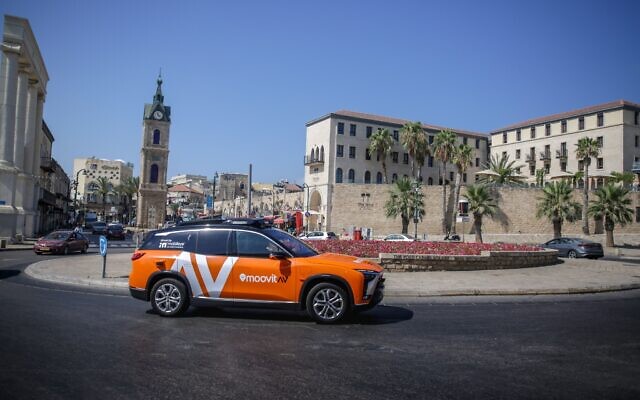Israeli law green-lights driverless cars
Move will allow Mobileye to advance plans for self-driving shared transportation in Tel Aviv this year

The Knesset has passed legislation that will allow companies to pilot autonomous shared transportation, like taxis, with passengers in the vehicle but without a safety driver on Israeli roads.
The bill, proposed by the Ministry of Transportation and Road Safety, passed in second and third readings in the plenum and paves the way for Mobileye, Intel’s autonomous driving subsidiary, to move ahead with plans to roll out “robo-taxis” and ride-hailing services in Tel Aviv this year.
Russian company Yandex has also been testing self-driving cars in Israel since late 2018, as global carmakers like Ford, Toyota, and Hyundai invest in models with self-driving systems.
The Israeli legislation allows companies and vehicle operators to obtain special licenses from the Ministry of Transportation and to conduct trials with autonomous cars “including for the purpose of transporting paying passengers” and “where an independent driving system replaces the driver,” according to the announcement.
This bill offers regulation on issues like insurance and different permits and establishes supervisory bodies as well as an advisory committee with representatives from relevant stakeholders.
“The State of Israel is at the forefront of the development of technologies in the field of self-driving vehicles,” according to the bill memorandum. “Today there are several companies, both Israeli and foreign, that are conducting trials with autonomous vehicle transportation.”
Jerusalem-based Mobileye currently has the largest international fleet of autonomous vehicles with pilots in Munich, Detroit, New York City, Tokyo, and most recently Paris. The Intel company has been testing self-driving vehicles in Israel since 2018, and in Munich since 2020.
Mobileye has bet on commercial robotaxi services in Tel Aviv, Munich and Paris, as well as self-driving shuttles for public transportation across Europe and delivery vehicles in the US as a first introduction of autonomous cars on the roads.
In Israel, the vehicles in the Mobileye fleet of robo-taxis are orange NIO SE8s, electric seven-seater SUVs made by Chinese electric vehicle (EV) manufacturer NIO, with which the company signed a collaboration agreement in 2019. The vehicles are powered by the company’s fully integrated self-driving system, dubbed Mobileye Drive, and developed specifically for commercial, driverless ride-hailing services.
According to the deal, NIO produces the Mobileye Drive system for Mobileye and integrates its Level 4 Autonomous Vehicle technology into its EV lines for consumer markets as well as for driverless ride-hailing services. Level 4 provides high automation without the need for human intervention in limited areas (also known as geofencing), but humans can still manually override if necessary.
Riders will be able to access the service on the app developed by Moovit, the Israeli smart transit data company Intel bought in 2020 for some $900 million, as well as an app developed by German-headquartered international car rental and mobility service giant Sixt SE, which combines ride-hailing, car rental, car-sharing and other offerings.
Times of Israel

comments